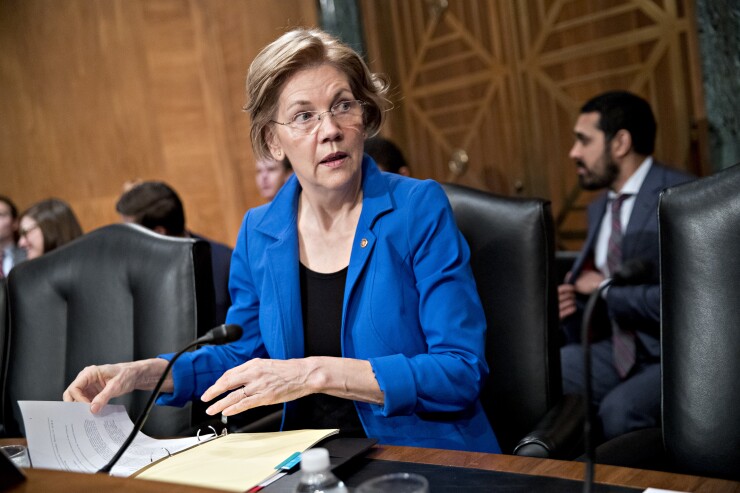
Sen. Elizabeth Warren, D-Mass., said bank regulators and treasury officials "appear to be taking the wrong lessons" from a string of bank failures this spring and should be more hard-nosed when making guidelines for bank mergers and acquisitions in the future.
In a letter to regulators Tuesday, Warren — who chairs the Senate Banking Subcommittee on Economic Policy — specifically called out Secretary of the Treasury Janet Yellen and Acting Comptroller of the Currency Micheal J. Hsu for being too permissive in allowing banks to merge.
"Secretary Yellen and Acting Comptroller Hsu have recently indicated that they appear to be taking the wrong lessons from these bank failures, suggesting that they would like to see more bank consolidation," Warren wrote in the letter to top officials at the Office of the Comptroller of the Currency, the Federal Deposit Insurance Corporation and the Federal Reserve, the agencies that work with the Department of Justice to issue bank merger guidelines. "This would represent exactly the wrong approach."
Warren's letter comes as regulators weigh updating their
Warren raised questions over the timeline on tougher M&A guidelines the White House requested two years ago and the slow rollout of consumer protections outlined in post-2008 regulations.
"Allowing additional bank consolidation would be a dereliction of your responsibilities, hurting American consumers and small businesses, betraying President Biden's commitment to promoting competition in the economy, and threatening the stability of the financial system and the economy," Warren said.
She zeroed in on the Justice Department's decision to stop forcing banks to divest branches in mergers while asking when regulators would release a report on how bank competition is impacted by mergers, which federal banking agencies are required to include in an annual report to Congress.
"I urge you to accelerate your work to update the bank merger review guidelines to put an end to regulators' practice of rubber stamping merger applications and strengthen the standards under which mergers are considered," she said, asking that the regulators respond to the questions outlined in the letter by July 10.
The Massachusets Senator has
That censure has intensified as the senator has said that banks misleadingly deemed "too-big-to-fail" have grown in size, particularly after JP Morgan Chase's
No regulator has formally denied a bank merging application in over 15 years and the number of commercial banks in the U.S. has fallen by 70% over the past two decades, Warren added.
"The trend is accelerating, with $77 billion in bank mergers and acquisitions in 2021 alone," she said.
Banks have since
Some industry groups had hoped that recent bank crashes would compel the Biden administration to walk back on its intentions to toughen the bank merger review process, a plan they argue could make it harder for regional banks to compete with their larger national counterparts.
That sentiment has been echoed in part by Secretary Yellen, who suggested that she would
Warren, however, argued that tighter bank M&A requirements would promote competition, moving power away from banking giants that she has said put taxpayers at risk.
"Shoring up our banking system will require stronger regulation and more vigorous oversight of big banks to keep them from failing in the first place, and stronger merger guidelines and rules that significantly check consolidation and limit the size and number of too-big-to-fail banks that put taxpayers at risk," the senator said.






